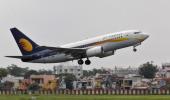The good news is that the government has taken notice of the pain and has formed a task force to improve operating procedure during foggy days.

It was not a pleasant first day of the year for the passengers of Jet Airways flight 9W-907.
While they boarded the Delhi-Kolkata flight on time at 10 am, the aircraft could only take off five hours later.
“It was a harrowing experience to wait inside the aircraft for five hours, there were children, elderly people and since the aircraft was on the ground we were not being allowed to use the lavatory,” said Smriti Mantri, a passenger on the flight.
With the fog in north India severely disrupting the airline’s schedule, one of the biggest irritants for flyers has been to wait endlessly inside the aircraft, waiting for it to fly.
Planes pushed back from the gate, only to sit on the runway for what seemed an eternity.
So why doesn’t the airline allow passengers to deplane during such a delay?
Blame it on multiple factors such as complicated rules which make de-boarding of passengers time consuming; a cut-throat business which forces airlines to jam multiple flights in a thin time slot; and infrastructure crunch at airports.
First, why are airlines reluctant to de-board passengers in case of delay?
The way aviation systems currently work in India, aircraft enter the take-off queue on a first-come-first-served basis.
The aircraft gets a departure sequence only when it has closed its door after boarding passengers.
“Once I close the doors, I am in queue. During extreme foggy days when schedules have been disrupted, there can be 100 planes in the queue.
"If I return to the gate, I lose the sequence and delay my passengers even more,” said the commander of a private airline.
Airline officials say there needs to be a change in this process.
“The departure sequence number should be given based on the scheduled time of departure and not boarding status.
"If an airline misses the sequence once fog clears, put them at the bottom of the list,” says an executive at a private airline.
Second, even if the passengers are disembarked, they have to go back into the arrival terminal and pass again through the security enclosure as the CISF has denied permission for reverse entry. Airlines don’t like to take that pain.
“It takes a lot of time again, forcing further delay. Why should the passenger have to undergo security again?
"They should wait directly at the gate and board again through the aerobridge or bus,” the airline executive says.
CISF boss O P Singh said reverse entry for passengers can cause a security breach.
“The airside is not a complete sanitised zone, there are ground handling staff and even outside workers near the runway.
"Once a passenger disembarks, any equipment can be handed over to him between boarding gate and the plane.
"It’s important that he undergoes security check for complete safety of the aircraft.”
Airlines, however, point out that it is exactly the same people who are around when the passengers board the aircraft.
“If someone wanted to hand something over to the passenger, they could do it during boarding too.
"Even in developed markets like the US, which has stringent security measures, reverse entry is permitted,” said the executive mentioned above.
Lastly, there is considerable doubt whether airport terminals will have space for passengers if airlines disembark them.
Look at Terminal 1 of Delhi Airport. Against a structural capacity of 11 million passengers per annum, it is handling almost 20 million passengers at peak hours.
It will not have any space if disembarked passengers come in.
The good news is that the government has taken notice of the pain and has formed a task force to improve operating procedure during foggy days.
“The panel will contemplate on various facts like building sterile zones where passengers can be sent after de-boarding, giving better fog alert so that passengers can be given more clarity,” the executive said.
Photograph: Danish Siddiqui/Reuters.











